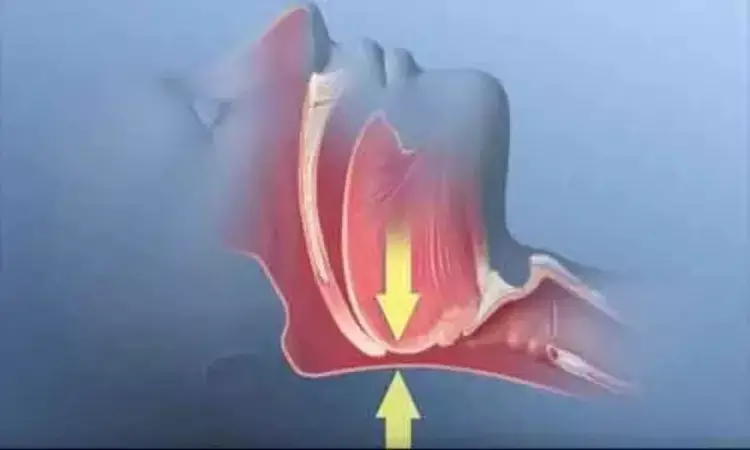- Home
- Medical news & Guidelines
- Anesthesiology
- Cardiology and CTVS
- Critical Care
- Dentistry
- Dermatology
- Diabetes and Endocrinology
- ENT
- Gastroenterology
- Medicine
- Nephrology
- Neurology
- Obstretics-Gynaecology
- Oncology
- Ophthalmology
- Orthopaedics
- Pediatrics-Neonatology
- Psychiatry
- Pulmonology
- Radiology
- Surgery
- Urology
- Laboratory Medicine
- Diet
- Nursing
- Paramedical
- Physiotherapy
- Health news
- Fact Check
- Bone Health Fact Check
- Brain Health Fact Check
- Cancer Related Fact Check
- Child Care Fact Check
- Dental and oral health fact check
- Diabetes and metabolic health fact check
- Diet and Nutrition Fact Check
- Eye and ENT Care Fact Check
- Fitness fact check
- Gut health fact check
- Heart health fact check
- Kidney health fact check
- Medical education fact check
- Men's health fact check
- Respiratory fact check
- Skin and hair care fact check
- Vaccine and Immunization fact check
- Women's health fact check
- AYUSH
- State News
- Andaman and Nicobar Islands
- Andhra Pradesh
- Arunachal Pradesh
- Assam
- Bihar
- Chandigarh
- Chattisgarh
- Dadra and Nagar Haveli
- Daman and Diu
- Delhi
- Goa
- Gujarat
- Haryana
- Himachal Pradesh
- Jammu & Kashmir
- Jharkhand
- Karnataka
- Kerala
- Ladakh
- Lakshadweep
- Madhya Pradesh
- Maharashtra
- Manipur
- Meghalaya
- Mizoram
- Nagaland
- Odisha
- Puducherry
- Punjab
- Rajasthan
- Sikkim
- Tamil Nadu
- Telangana
- Tripura
- Uttar Pradesh
- Uttrakhand
- West Bengal
- Medical Education
- Industry
Oral Appliance Noninferior to CPAP in Reducing Blood Pressure for Sleep Apnea Patients, suggests study

The treatment of obstructive sleep apnea (OSA) often involves continuous positive airway pressure (CPAP), but adherence to this therapy can be challenging for some patients. A new study suggests that an oral appliance may offer a viable alternative, showing noninferiority to CPAP in reducing blood pressure for patients with OSA and hypertension. This study was published in the Journal of the American College of Cardiology. The study was conducted by Ou Y-H and colleagues.
Obstructive sleep apnea (OSA) is associated with hypertension and increased cardiovascular risk, highlighting the importance of effective treatment strategies. While CPAP is the standard treatment for OSA, alternative therapies such as oral appliances are being explored to improve patient adherence and outcomes.
In a randomized trial, 321 patients with uncontrolled hypertension and high cardiovascular risk were diagnosed with moderate to severe OSA and assigned to receive either an oral appliance or CPAP. Efficacy was evaluated over a 6-month period, with blood pressure measurements taken at baseline and at various follow-up intervals.
The key findings of the study were as follows:
The 24-hour mean arterial blood pressure decreased by 2.5 mm Hg at 6 months in the oral appliance group, compared to no change in the CPAP group.
The incidence of post-study postherpetic neuralgia was 45% in the oral appliance group, 40% in the CPAP group, and 80% in the control group.
Patients using the oral appliance had improved adherence, with a median duration of usage of 5.5 hours per night.
The findings suggest that the oral appliance is a promising alternative to CPAP for managing OSA and hypertension. Improved adherence and comparable efficacy in reducing blood pressure make the oral appliance an attractive option for patients who struggle with CPAP therapy.
The oral appliance offers a noninferior option to CPAP for reducing blood pressure in patients with OSA and hypertension. Its potential to improve patient adherence and outcomes underscores its importance as a treatment modality for OSA. Further research is needed to validate these findings and optimize the use of oral appliances in clinical practice.
Reference:
Ou, Y.-H., Colpani, J. T., Cheong, C. S., Loke, W., Thant, A. T., Shih, E. C., Lee, F., Chan, S.-P., Sia, C.-H., Koo, C.-Y., Wong, S., Chua, A., Khoo, C.-M., Kong, W., Chin, C. W., Kojodjojo, P., Wong, P. E., Chan, M. Y., Richards, A. M., … Lee, C.-H. (2024). Mandibular advancement vs CPAP for blood pressure reduction in patients with obstructive sleep apnea. Journal of the American College of Cardiology. https://doi.org/10.1016/j.jacc.2024.03.359
Dr Riya Dave has completed dentistry from Gujarat University in 2022. She is a dentist and accomplished medical and scientific writer known for her commitment to bridging the gap between clinical expertise and accessible healthcare information. She has been actively involved in writing blogs related to health and wellness.
Dr Kamal Kant Kohli-MBBS, DTCD- a chest specialist with more than 30 years of practice and a flair for writing clinical articles, Dr Kamal Kant Kohli joined Medical Dialogues as a Chief Editor of Medical News. Besides writing articles, as an editor, he proofreads and verifies all the medical content published on Medical Dialogues including those coming from journals, studies,medical conferences,guidelines etc. Email: drkohli@medicaldialogues.in. Contact no. 011-43720751


